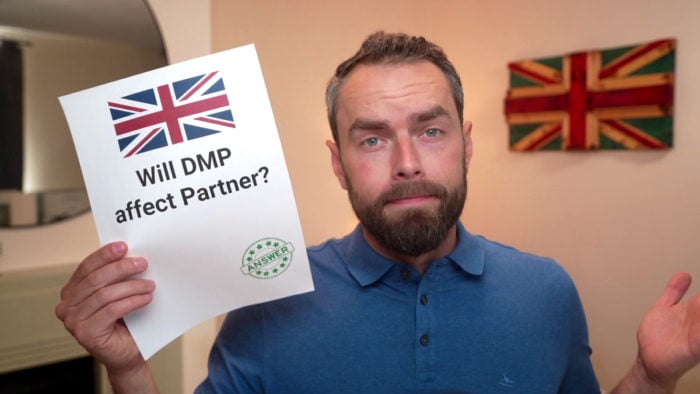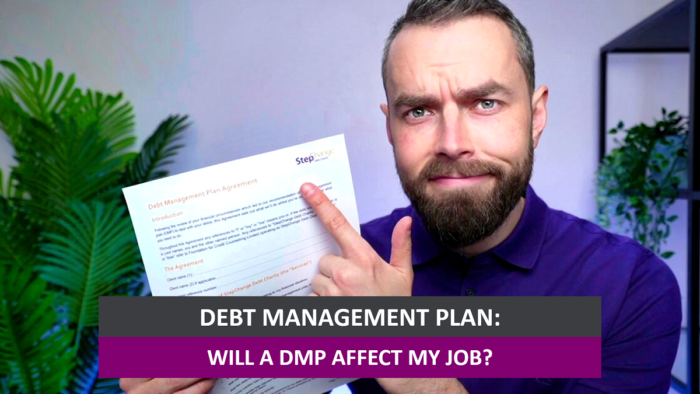Will My DMP Affect My Partner? Complete Guide
For free & impartial money advice you can visit MoneyHelper. We work with The Debt Advice Service who provide information about your options. This isn’t a full fact-find, some debt solutions may not be suitable in all circumstances, ongoing fees might apply & your credit rating may be affected.

For free & impartial money advice you can visit MoneyHelper. We work with The Debt Advice Service who provide information about your options. This isn’t a full fact-find, some debt solutions may not be suitable in all circumstances, ongoing fees might apply & your credit rating may be affected.
Are you thinking about a Debt Management Plan (DMP) but worried it may affect your partner’s money matters?
You’re in the right place. Each month, over 170,000 people visit our site looking for guidance on debt solutions.
This article will cover:
- What a DMP is and how it can affect your partner’s finances
- Understanding your financial link to your partner
- How a DMP could change your partner’s credit score
- The chance of losing your house because of a DMP
- The good and bad sides of a DMP
Some of our team have had money troubles before, so we know how hard it can be. Our aim is to give you the facts and help you make the best choice for you and your partner.
Will It Affect My Partner?
That depends on a number of factors, the most important one being the types of debt(s) that you have.
Please note that any secured/priority debts that you share with your partner (such as a mortgage) cannot be included within a DMP so you’ll have to keep making payments to those debts as usual. This would mean that these payments would remain the same and would be separate from your DMP.
On the other hand, if you have unsecured debts that you share with your partner or spouse, it can be a good idea to get a joint debt management plan with them.
This will allow you to utilise both of your incomes to take care of your debts a lot more quickly and effectively.
You might be surprised to find out that a DMP can be set up between you and your partner even if your partner’s income is different from yours. Furthemore, a joint DMP can still be set up even if your partner has other debts besides the unsecured debt(s) that they owe collectively with you.
For more information on how to set up a joint debt management plan, you should contact your DMP provider or debt management company.
You can find also out more about joint debt management plans by clicking here.
» TAKE ACTION NOW: Fill out the short debt form
Will It Affect My Partner’s Credit Rating?
If you have taken out a debt management plan for yourself, in most cases, your partner’s credit rating should not be affected.
That being said, there might be a chance that their credit rating is affected if you have a financial association with them. This could be any collective debt you owe such as a mortgage loan or a personal loan.
This is because you’ll be making reduced payments to these debts as part of your DMP and these reduced payments might show up within your partner’s credit file as well.
It’s important to note that your partner’s credit score will not be affected if they are a secondary cardholder on your credit card account. Only the primary cardholder is responsible for the outstanding balance on a credit card and only their credit report gets affected by it.
Furthermore, your partner’s credit rating is also not affected if they act as a guarantor for a loan for you. Though, it could be affected if they are required to make a debt repayment on behalf of you and they are unable to do so.
How a debt solution could help
Some debt solutions can:
- Stop nasty calls from creditors
- Freeze interest and charges
- Reduce your monthly payments
A few debt solutions can even result in writing off some of your debt.
Here’s an example:
Situation
| Monthly income | £2,504 |
| Monthly expenses | £2,345 |
| Total debt | £32,049 |
Monthly debt repayments
| Before | £587 |
| After | £158 |
£429 reduction in monthly payments
If you want to learn what debt solutions are available to you, click the button below to get started.
Is it Possible that We’ll Lose Our House?
A debt management plan is an informal debt solution. This means that it’s not legally binding. Your creditors have every right to pursue court action against you if they feel you’re not doing a good job of paying back your debt.
That being said, this is extremely rare.
If you’re starting to fall behind on your DMP payments, I highly advise that you contact your DMP provider immediately. A debt management plan is an extremely flexible debt solution.
Depending on your situation and your circumstances, your DMP provider might be able to reduce payments of your DMP for you.
This will help you make your DMP payments on time and in full and furthermore, it will discourage your creditors from pursuing any type of court action against you.
My suggestion here is to never let it get to this stage. Whenever you get an inkling of the fact that you might fall behind on your debt payments for the month, you should get in touch with your DMP provider and work something out.
It’s important to keep the payments in check so that creditors don’t pursue legal action against you for your debt.
Your creditors pursuing a county court judgment (CCJ) and charging orders for your debt is more likely if you have a relatively high amount of debt that you’ve been paying in very low monthly amounts over a long period of time.
If this is the case and there’s equity in your home, then there’s a likelihood that your creditor(s) might pursue legal action to obtain the property that you and your partner reside in.


